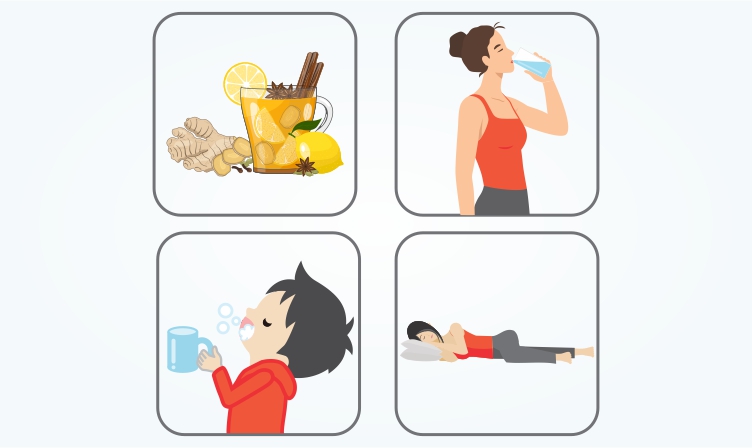Managing your Cough during COVID-19 Infection

Managing the cough, clearing it out properly and being able to breathe freely again is a big part of the recovery process that every COVID-19 patient has to go through. Here are a few tips that a patient can follow for a quick recovery:
Tips to manage a dry cough:
A dry cough is likely to put greater strain on your throat. The following strategies can be used to manage a dry cough-
- Stay hydrated by drinking plenty of water (lukewarm preferably)
- Take small sips of fluids instead of taking large sips to facilitate swallowing.
- Steam inhalation is necessary to cure a dry cough. So pour hot water into a bowl and put your head over the bowl and breathe in the steam. If comfortable, cover your head and bowl with a towel. You can also use a steam inhalation machine if you have one.
- Drink warm honey and lemon or another warm drink like kadha to soothe irritated throat
- Salt water gargle or Betadine gargle (1 part betadine & 3 part of water) can be effective for treating a sore throat.
- If you feel the need to cough but don’t have a soothing drink or water at hand, swallow repeatedly.
Tips to manage a productive cough:
A phlegmatic or productive cough can become difficult to manage since you have to spit out the phlegm-filled sputum regularly. It’s also important to note that viral infections, especially COVID-19, are contagious, so proper disposal of sputum is very important. You should also ensure that the sink where you dispose of your sputum is regularly disinfected. The following strategies can be used to manage a productive cough:
- Keep yourself hydrated with lukewarm water, broths, soups, herbal teas and kadha.
- Take steam inhalation at least thrice a day to loosen the phlegm congested in your lungs.
- Lie on either the left or the right side, instead of lying on your back. This might help drain the phlegm faster. 13 Fatigue Management Chronic fatigue is classified as fatigue lasting more than six weeks. The impact of fatigue is more than just lower productivity. You can manage your fatigue through following:
- Planning for demanding (physically, mentally) and repetitive tasks
• Regular staggered breaks during a day allow for both physical and mental restoration as well as social distancing - Days off during the week
- Plan your day schedule to allow you a better plan for completing your work as well as sleep between work periods 14
- Movement makes the lungs function, and it can also move the phlegm to facilitate your spitting it out. So, try to be mobile by walking around your room.






